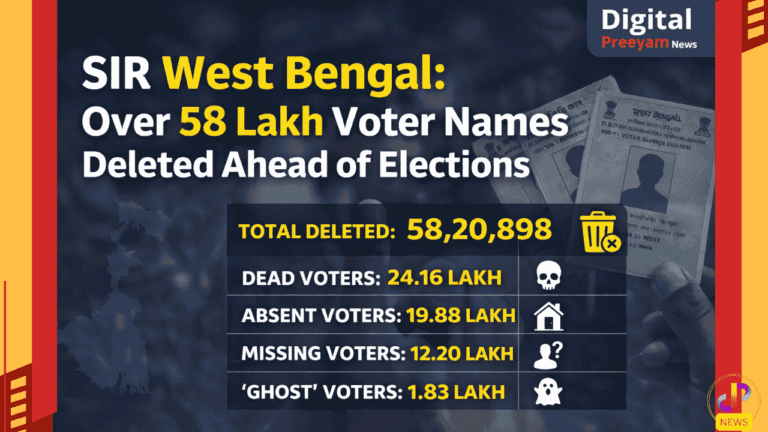Vikram 32 Bit Semiconductor Processor: ISRO Launches India’s First Indigenous Space Chip
Vikram 32 Bit Semiconductor Processor Presented to PM Modi at Semicon India 2025:
Kolkata, Sep 5, 2025:
Union Electronics and Information Technology Minister Ashwini Vaishnaw unveiled India’s first indigenously developed Vikram 32 bit Semiconductor Processor at the Semicon India 2025 conference. The historic chip was presented to Prime Minister Narendra Modi, marking a major milestone in India’s semiconductor self-reliance journey.
Developed by the Indian Space Research Organisation (ISRO)’s Semiconductor Laboratory (SCL), Chandigarh, the Vikram-32 is India’s first fully indigenous 32-bit microprocessor designed specifically for space applications. Built on a 180 nm CMOS process, the chip has been tested to survive the extreme conditions of rocket launches and deep-space environments.
What is Vikram-32?
The Vikram 32 bit Semiconductor Processor is the successor to ISRO’s VIKRAM1601 – a 16-bit microprocessor that has powered Indian launch vehicles since 2009. Unlike consumer-grade processors that focus on speed, Vikram-32 prioritises radiation tolerance, reliability, and deterministic performance, making it suitable for space launches, satellites, and planetary missions.
Key Features:
32-bit architecture with floating-point computation
Custom Instruction Set Architecture (ISA)
Supports Ada programming language, with C compiler in development
Designed for navigation, guidance, and control systems in launch vehicles
Successfully validated during PSLV-C60’s POEM-4 platform test
Global Context: How Vikram-32 Compares
With Vikram-32, India joins the league of nations that have indigenously developed space-grade processors.
RAD750 (USA): Used in NASA’s Mars rovers and deep-space probes.
LEON (Europe): Deployed in multiple European spacecraft.
Loongson (China): Recently tested in China’s Tiangong Space Station.
Although the 180 nm node may appear modest compared to commercial processors (Intel and AMD chips now use sub-3nm processes), it is internationally preferred for radiation resilience in space.
Future Applications:
The Vikram 32 bit Semiconductor Processor will primarily power ISRO’s launch vehicles, but its potential extends to:
Satellites and planetary missions
Defence and aerospace systems
Automotive and energy sectors
Its robust design ensures high reliability in mission-critical operations where system failure is not an option.
India’s Semiconductor Roadmap:
Minister Ashwini Vaishnaw announced that five semiconductor fabrication units are under construction across India, with 10 major projects worth ₹1.6 lakh crore approved. More than 23 chip design startups have also been supported under the government’s Design Linked Incentive (DLI) Scheme.
The unveiling of the Vikram 32 bit Semiconductor Processor signals India’s rise as a strong player in the global semiconductor value chain.
Final Thoughts: Vikram 32 Bit Semiconductor Processor and India’s Space Future
The launch of the Vikram 32 bit Semiconductor Processor is not just a technological milestone, but a symbol of India’s growing self-reliance in advanced technology. By developing space-grade processors, India has closed the gap with international players and is now positioned as a competitive force in the semiconductor race.
As the world moves toward 64-bit processors, AI-enabled chips, and quantum computing, India’s Vikram-32 marks the first step in a long journey toward semiconductor leadership.
📢 Stay Updated with Digital Preeyam News – Latest World News:
For more insights on India’s semiconductor mission, space technology, and global tech race, follow Digital Preeyam News – World News Section.
✅ Breaking updates on Vikram 32 Bit Semiconductor Processor and ISRO’s space innovations
✅ Expert insights on India’s semiconductor industry and global chip competition
✅ In-depth analysis of international tech policies, AI in space, and digital economy
👉 Subscribe now to Digital Preeyam News and never miss an update on the stories shaping our future.
Social Media Profile:
❓ Frequently Asked Questions (FAQs) – All You Need to Know About the Vikram 32 Bit Semiconductor Processor | Digital Preeyam News:
1. What is the Vikram 32 Bit Semiconductor Processor?
Answer: The Vikram 32 Bit Semiconductor Processor, also called Vikram-32, is India’s first indigenous space-grade microchip developed by ISRO’s Semiconductor Laboratory (SCL), Chandigarh.
2. Who launched the Vikram 32 Bit Semiconductor Processor?
Answer: Union Information and Broadcasting Minister Ashwini Vaishnaw unveiled the Vikram-32 processor and presented it to Prime Minister Narendra Modi at the Semicon India 2025 conference.
3. Who developed the Vikram-32 microchip?
Answer: The Vikram-32 microchip was developed by the Indian Space Research Organisation (ISRO)’s Semiconductor Laboratory (SCL) in Chandigarh.
4. What are the features of the Vikram-32 microprocessor?
Answer: Vikram-32 is a radiation-tolerant, 32-bit processor built on a 180nm CMOS process. It supports floating-point arithmetic, deterministic behavior, and in-house Ada language programming tools, making it suitable for extreme space conditions.
5. Where has the Vikram-32 processor been tested?
Answer: The Vikram-32 processor was successfully validated on PSLV-C60’s POEM-4 platform and handed over for production in March 2025.
6. How does Vikram-32 compare to global space processors?
Answer: Vikram-32 is comparable to processors like the US-made RAD750 and Europe’s LEON, which are widely used in space missions for their reliability under radiation and extreme temperatures.
7. What are the future applications of the Vikram-32 processor?
Answer: Beyond launch vehicle navigation and control, Vikram-32 could be used in satellites, planetary missions, defense, aerospace, automotive, and energy sectors.

















